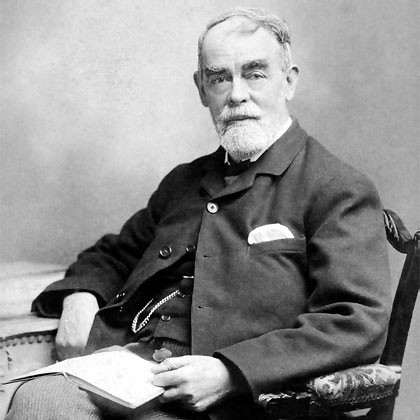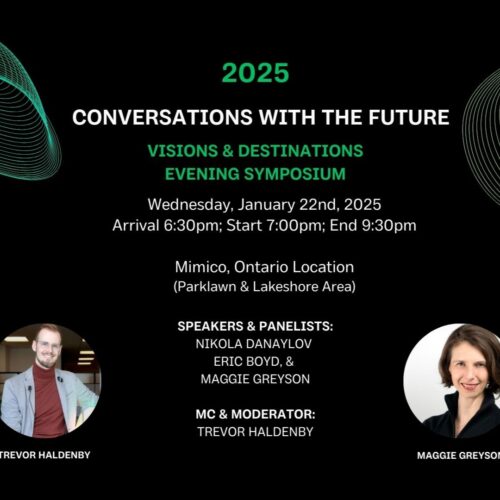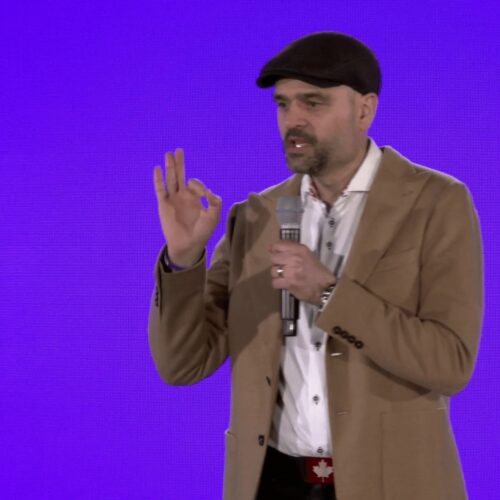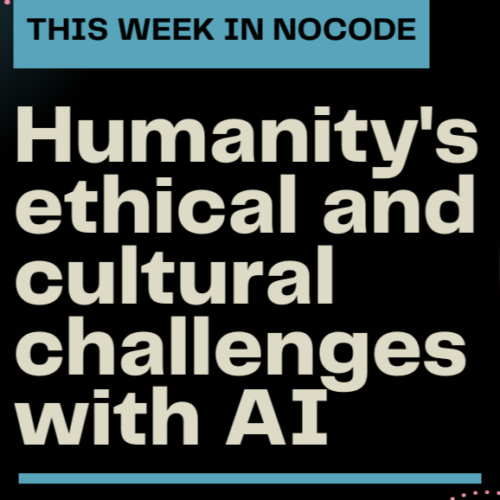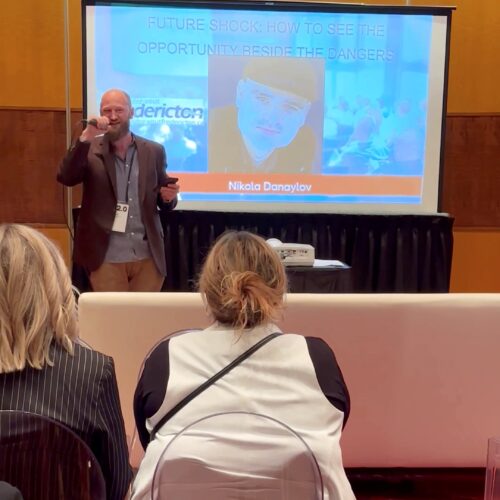Ray Kurzweil: As Humans and Computers Merge… Immortality?
In previous parts of his series on Making Sen$e of financial news, Paul Solman has been showcasing the future of technology and shining the spotlight on Singularity University. In this video, Solman interviews inventor Ray Kurzweil, who predicts that advancing technology will result in augmented brains, memories recorded on “mind files” and a greatly increased (i.e. indefinite life) span.
Audio Version:
Transcript:
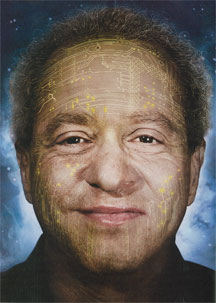 GWEN IFILL: Next, we take a very different look at a future — the future for human health and longevity.
GWEN IFILL: Next, we take a very different look at a future — the future for human health and longevity.
Paul Solman, the NewsHour’s economics correspondent, has been exploring the profound social and economic changes brought on by rapidly changing technology. Tonight, he checks in with an inventor and futurist who takes the concept of advances in the medical field even further. It’s part of his ongoing reporting Making Sense of financial news.
PAUL SOLMAN: Earlier this year, we did several stories at a conference run by the futuristic California think tank Singularity University.
The stories were about-high tech’s prodigious promise for the future, dirt-cheap energy, sky-high crop yields, labor-free machinery. Tonight comes the kicker, far longer, far healthier, conceivably even eternal life.
Why would immortality be an economics rather than a science story? Because the basic aim of economics is to maximize well-being, the greatest good for the greatest number. And a longer, healthier life is the most unambiguous good there is, says Singularity’s co- founder, Ray Kurzweil, skeptics notwithstanding.
RAY KURZWEIL, co-founder, Singularity University: People say, oh, I don’t want to live past 100. And I say, OK, I would like to hear you say that when you’re 100.
PAUL SOLMAN: Assuming they will be hale and hearty at 100, which Kurzweil emphatically does. In fact, he firmly believes that at, age 100, he will just be getting started.
RAY KURZWEIL: I think I have a very good chance of making it through.
PAUL SOLMAN: But, when you say making it through, you mean, essentially, live forever?
RAY KURZWEIL: Indefinitely. I mean, I can never talk to you and say I have done it, I have lived forever. But the goal is to put that decision in our own hands, rather than the metaphorical hands of fate.
PAUL SOLMAN: Now, before you dis Ray Kurzweil’s prediction that death will become an elective procedure, note that he’s known for being ahead of the curve. This footage comes from a film about him, “Transcendent Man.”
RAY KURZWEIL: My name is Raymond Kurzweil, and I’m from Queens, New York.
PAUL SOLMAN: While still in high school, he was invited on TV’s “I’ve Got a Secret” to show off the computer he’d programmed to compose music in the style of classical composers.
MAN: Raymond, how old are you?
RAY KURZWEIL: I’m 17.
MAN: Do your parents know what you have been up to?
(LAUGHTER)
PAUL SOLMAN: In his 20s, he invented a reading machine for the blind.
MAN: They have invented a machine that can make any book talk.
MACHINE VOICE: Four score and seven years ago.
PAUL SOLMAN: His first customer was Stevie Wonder. . .
STEVIE WONDER, musician: Obviously, it was a life-changer.
PAUL SOLMAN: . . . starting a lifelong friendship that led to the development of Kurzweil’s second major invention, a musical synthesizer that sounded like real instruments — in short, a string of breakthroughs that boggle the human brain, when you think of how primitive computer brains were back then.
But computers had been getting more powerful fast, which got Kurzweil thinking ahead.
RAY KURZWEIL: In 1981, I noticed this remarkable exponential curve, which was very smooth. And I extended that curve out to 2050. Now we’re in 2012. It’s 30 years later, and were very much on that curve.
PAUL SOLMAN: What Kurzweil had noticed, as illustrated in the “Transcendent Man” documentary, was that all information technologies progress exponentially, doubling in performance while decreasing in size and price. Double every year, one, two, four, eight, 16, and so forth, and in just three decades, you have topped one billion.
RAY KURZWEIL: This is several billion times more powerful per dollar than the computer I used when I was a student. It’s 100,000 times smaller. We can create computers twice as powerful as they are today next year, because we’re using today’s computers to create them.
PAUL SOLMAN: While Kurzweil’s brain is nothing to sneeze at, he thinks even he won’t be able to compete with tomorrow’s computers.
RAY KURZWEIL: Artificial intelligence will reach human levels by around 2029. Follow that out further to, say, 2045, we will have multiplied the intelligence, the human biological machine intelligence of our civilization a billion-fold.
PAUL SOLMAN: A billion-fold from today?
RAY KURZWEIL: Right.
That’s such a singular change that we borrow this metaphor from physics and call it a singularity, a profound disruptive change in human history. Our thinking will become a hybrid of biological and non-biological thinking.
PAUL SOLMAN: But, for the purposes of immortality, and therefore this story, so will our other bodily functions become a hybrid, insists Kurzweil, as humans and computers merge.
RAY KURZWEIL: The electronics will be so small, and we will put computerized devices that are the size of blood cells inside our body to keep us healthy. A new biological virus comes out, these little nanobots could download their software to combat that new pathogen.
PAUL SOLMAN: And so, immortality.
RAY KURZWEIL: We will get to a point 15 years from now where, according to my models, we will be adding more than a year every year to your remaining life expectancy, where the sands of time are running in rather than running out, where your remaining life expectancy actually stretches out as time goes by.
PAUL SOLMAN: Of course, as more time goes by, there will be more to remember. But Kurzweil says we will have augmented brains to retain more of it.
RAY KURZWEIL: Information defines your personality, your memories, your skills. And it really is information. And we ultimately will be able to capture that and actually recreate it. So then we will back ourselves up. People a hundred years from now will think it pretty amazing. People actually went through the day without backing up their mind file?
PAUL SOLMAN: You mean, back up your mind, so that all the memories you had yesterday, you will have tomorrow?
RAY KURZWEIL: It will be there in case it gets damaged. So if you hit the proverbial bus and it damages part of your brain, you can recreate that.
PAUL SOLMAN: And to make sure he’s ready, in good shape for the tipping point, Ray Kurzweil has been following a rigorous health program for decades now, ever since being diagnosed with diabetes in his 30s.
RAY KURZWEIL: Aging is not one process. It’s many different things going on that cause us to age. I have a program that at least slows down each of these different processes.
I’m constantly testing myself, hormone levels, nutrient levels, and the usual things like cholesterol and C-reactive protein and keeping things in what I consider to be optimal ranges.
PAUL SOLMAN: His cholesterol, for example, has dropped from 280 to 100, thanks to a strict regimen of diet, exercise, statin drugs and nutritional supplements. He takes about 150 pills a day.
And then there are injections and I.V. drips for the more exotic substances.
RAY KURZWEIL: I will give you one example. In a baby, 90 percent of the cell membrane is made up of phosphatidylcholine. That substance is responsible for letting the nutrients in, letting toxins out, keeping the cell supple.
By the time you’re 90 years old, the level of phosphatidylcholine you have will be less than 10 percent of what you had as a child.
PAUL SOLMAN: So you’re getting shots of this?
RAY KURZWEIL: It’s an I.V. If you’re aggressive, even baby boomers in their 60s can be in good shape when we get to these more powerful technologies. But you have to be aggressive. If you’re oblivious to it, then it would be too late.
PAUL SOLMAN: High tech CEO Carl Bass, 55, is also part of Kurzweil’s Singularity crowd, but a tad less optimistic.
CARL BASS, CEO, Autodesk: I feel like I just missed out.
PAUL SOLMAN: Just missed out? That’s how I feel. I’m 67, and I think, my gosh, if I would only been born 10, 15, 20 years later.
CARL BASS: I feel exactly the same way you do. I become more optimistic about what’s possible, even if a little bit longing about what I may not get to enjoy.
PAUL SOLMAN: But wait. Are there no true skeptics in the high-tech universe? What about co-mapper of the human genome and recent creator of a supposedly new form of life Craig Venter?
How old are you?
CRAIG VENTER, CEO, Synthetic Genomics: About 65. I wouldn’t mind getting to 100.
(LAUGHTER)
PAUL SOLMAN: Are you regretful that you’re going to miss the moment of immortality?
CRAIG VENTER: I don’t think we’re going to ever get there. I know a little bit more about biological reality. What I have argued, if you want to be immortal, do something useful in your lifetime.
RAY KURZWEIL: Craig Venter is a brilliant, very innovative person, but in this instance, he is not appreciating exponential growth.
You really have to think about it and calculate it out, because it’s not intuitive.
PAUL SOLMAN: In the end, though, if Ray Kurzweil is correct, a key question. Should the dead eventually disappear, how would the world cope with an impossibly large number of the living? By colonizing space is one common high-tech answer.
And we will be covering that, if the NewsHour would want yet another story about the future, with one proviso. To paraphrase my beloved grandmother, we should live so long.
GWEN IFILL: If you’re intrigued by Ray Kurzweil’s ideas, we have posted more of his conversation online. He talked to Paul about artificial intelligence, technology’s changing role in our lives, and what it means to be human.
Related articles
- TIME Magazine’s 10 Questions for Ray Kurzweil
- PBS NewsHour on Man vs. Machine: Will Human Workers Become Obsolete?
- PBS NewsHour covers Singularity University



